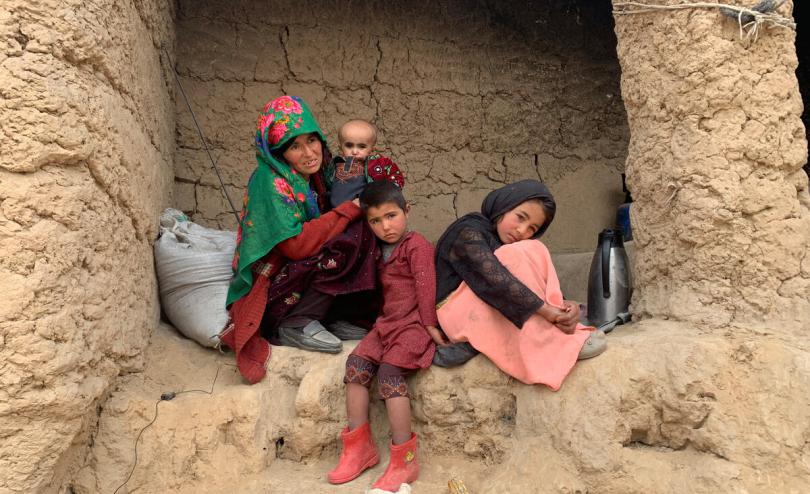Almost 10 million children going hungry in Afghanistan as food aid alone fails to the meet tidal wave of need, Save the Children says

KABUL, 9 May 2022 – 9.6 million children in Afghanistan are going hungry every day due to a dire combination of economic collapse, the impacts of the war in Ukraine and the ongoing drought, new figures released today show. Immediate food assistance is needed to save lives in the short-term, but aid alone is not enough to tackle the country’s worst hunger crisis on record, Save the Children said.
The figures[i] show that despite a significant amount of food aid provided to families in recent months, 19.7 million children and adults – almost 50% of the population – are still going hungry and need urgent support to survive. From March to May alone, 20,000 people were pushed into famine.
When the Taliban took control in August last year, the international community responded largely by freezing assets and suspending development assistance to mitigate the risk of indirectly providing funds to the de-facto Taliban administration.
Afghan children are now bearing the brunt of the international community’s policies, which have starved the country of cash, and sent the economy into a downward spiral. Poverty, unemployment and food prices have dramatically increased, forcing parents to take desperate measures to feed their children.
Save the Children's Director of Advocacy, Communications and Media, Athena Rayburn said:
“Every single day our frontline health workers are treating children who are wasting away in front of our eyes because they’re only eating bread once a day –and those are the lucky ones. Children in Afghanistan have never known a life without conflict, and if action is not taken soon, they will not know a world without gnawing hunger and empty stomachs. Now is not the time for the world to turn its backs on Afghanistan’s children.
“Although 18.9 million children and adults are projected to need food aid from June to November this year, there is only enough funding to provide support for 3.2 million people. With the world’s attention diverted to Ukraine, there is waning hope of addressing this crisis in time. Each day that passes without the funds needed sees more children lose their lives to preventable causes.
“The international community must address both the gap in funds and Afghanistan’s economic collapse by identifying ways to increase liquidity in the country’s economy. Until the economic crisis is addressed, and rising poverty stemmed, children will continue to face catastrophic levels of hunger. Aid alone cannot save their lives.”
Maryam*, 26, has five children and lives in Faryab Province in Afghanistan, where many families only have one meal a day, and the public hospitals are overflowing with children suffering from severe acute malnutrition. Maryam’s husband is in Iran trying to find work so he can send money back to his family to help them survive.
“I am worried about my children,” Maryam told Save the Children. “I can only borrow cash and buy them food but mostly I don’t have sufficient food for them. Sometimes we have food to eat and some days we don’t.”
Maryam recently borrowed a large sum of money to take her baby Khal Mirza*, who has severe acute malnutrition, to hospital. Once he was discharged from hospital, Maryam took him to one of Save the Children’s mobile health clinics, which provide services in her community.
Following treatment with Save the Children’s doctors, Khal Mirza is thankfully improving. But many severely malnourished children are not so lucky. With Afghanistan’s healthcare system desperately lacking resources and staff, many children cannot access the care they need to survive. A Save the Children assessment also found that more than 50 percent of surveyed families couldn’t access healthcare, mainly because they didn’t have the money to pay for the services.
The crisis in Afghanistan comes at a time when the world is facing its biggest hunger crisis this century, with an estimated 44 million children and adults on the brink of starvation across the globe.
ENDS
CONTENT:
Maryam & Khal Mirza’s story: https://www.contenthubsavethechildren.org/Package/2O4C2SSBA7L9
[1] The Integrated Phase Classification (IPC) figures for Afghanistan, March – May 2022.
NOTES TO EDITORS
- The Integrated Phase Classification (IPC)is an internationally recognised famine early-warning system, based on a scale from one (minimal food stress) to five (catastrophe/famine). According to the IPC report:
- 19.7M people (9.6M children) are facing high levels of acute food insecurity (IPC Phase 3 and above) between March 2022 and May 2022
- 18.9M people (9.2 M children) are projected to face high levels of acute food insecurity (IPC Phase 3 and above) between June and Nov 2022.
- Starting from March 2022, a major scale-up of assistance was initiated in Afghanistan. Based on data shared by the World Food Programme, an estimated 15.9 million (38%) people are assisted in the current period (March-May).
- The unprecedented level of Humanitarian Food Assistance (HFA) for the March – May 2022 period will decrease significantly due to extremely limited funding prospects. For June to Nov, the HFA will cover only 8% of the population and will therefore have minimal mitigating effects.
- From March to May 2022, 20,000 were pushed into famine – IPC phase 5.
- Save the Children’s health and nutrition teams in Afghanistan are delivering lifesaving health and nutrition services for children under five and pregnant and breastfeeding mothers, including treating women and children suffering from acute malnutrition, The agency is also providing counselling on recommended feeding practices to protect, promote and support breastfeeding and complementary feeding, and providing children diverse and nutritious diets.
- *Names have been changed
*******************************************************************************************************************
For further enquiries please contact:
- Sacha Myers – Sacha.myers@savethechildren.org (based in Kabul)
- Charlie Rose - charlotte.rose@savethechildren.org (based in Bangkok)
- Samantha Halyk – Samantha.halyk@savethechildren.org (based in London)
Our media out of hours (BST) contact is media@savethechildren.org.uk / +44(0)7831 650409
Please also check our Twitter account @Save_GlobalNews for news alerts, quotes, statements and location Vlogs.




